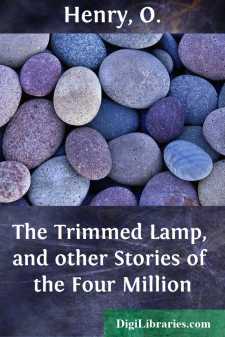Categories
- Antiques & Collectibles 13
- Architecture 36
- Art 48
- Bibles 22
- Biography & Autobiography 813
- Body, Mind & Spirit 142
- Business & Economics 28
- Children's Books 16
- Children's Fiction 13
- Computers 4
- Cooking 94
- Crafts & Hobbies 4
- Drama 346
- Education 46
- Family & Relationships 57
- Fiction 11829
- Games 19
- Gardening 17
- Health & Fitness 34
- History 1377
- House & Home 1
- Humor 147
- Juvenile Fiction 1873
- Juvenile Nonfiction 202
- Language Arts & Disciplines 88
- Law 16
- Literary Collections 686
- Literary Criticism 179
- Mathematics 13
- Medical 41
- Music 40
- Nature 179
- Non-Classifiable 1768
- Performing Arts 7
- Periodicals 1453
- Philosophy 64
- Photography 2
- Poetry 896
- Political Science 203
- Psychology 42
- Reference 154
- Religion 513
- Science 126
- Self-Help 84
- Social Science 81
- Sports & Recreation 34
- Study Aids 3
- Technology & Engineering 59
- Transportation 23
- Travel 463
- True Crime 29
Whirligigs
by: O. Henry
Description:
Excerpt
VIISOCIOLOGY IN SERGE AND STRAW
The season of irresponsibility is at hand. Come, let us twine round our brows wreaths of poison ivy (that is for idiocy), and wander hand in hand with sociology in the summer fields.
Likely as not the world is flat. The wise men have tried to prove that it is round, with indifferent success. They pointed out to us a ship going to sea, and bade us observe that, at length, the convexity of the earth hid from our view all but the vessel's topmast. But we picked up a telescope and looked, and saw the decks and hull again. Then the wise men said: "Oh, pshaw! anyhow, the variation of the intersection of the equator and the ecliptic proves it." We could not see this through our telescope, so we remained silent. But it stands to reason that, if the world were round, the queues of Chinamen would stand straight up from their heads instead of hanging down their backs, as travellers assure us they do.
Another hot-weather corroboration of the flat theory is the fact that all of life, as we know it, moves in little, unavailing circles. More justly than to anything else, it can be likened to the game of baseball. Crack! we hit the ball, and away we go. If we earn a run (in life we call it success) we get back to the home plate and sit upon a bench. If we are thrown out, we walk back to the home plate—and sit upon a bench.
The circumnavigators of the alleged globe may have sailed the rim of a watery circle back to the same port again. The truly great return at the high tide of their attainments to the simplicity of a child. The billionaire sits down at his mahogany to his bowl of bread and milk. When you reach the end of your career, just take down the sign "Goal" and look at the other side of it. You will find "Beginning Point" there. It has been reversed while you were going around the track.
But this is humour, and must be stopped. Let us get back to the serious questions that arise whenever Sociology turns summer boarder. You are invited to consider the scene of the story—wild, Atlantic waves, thundering against a wooded and rock-bound shore—in the Greater City of New York.
The town of Fishampton, on the south shore of Long Island, is noted for its clam fritters and the summer residence of the Van Plushvelts.
The Van Plushvelts have a hundred million dollars, and their name is a household word with tradesmen and photographers.
On the fifteenth of June the Van Plushvelts boarded up the front door of their city house, carefully deposited their cat on the sidewalk, instructed the caretaker not to allow it to eat any of the ivy on the walls, and whizzed away in a 40-horse-power to Fishampton to stray alone in the shade—Amaryllis not being in their class. If you are a subscriber to the Toadies' Magazine, you have often—You say you are not? Well, you buy it at a news-stand, thinking that the newsdealer is not wise to you. But he knows about it all. HE knows—HE knows! I say that you have often seen in the Toadies' Magazine pictures of the Van Plushvelts' summer home; so it will not be described here....












